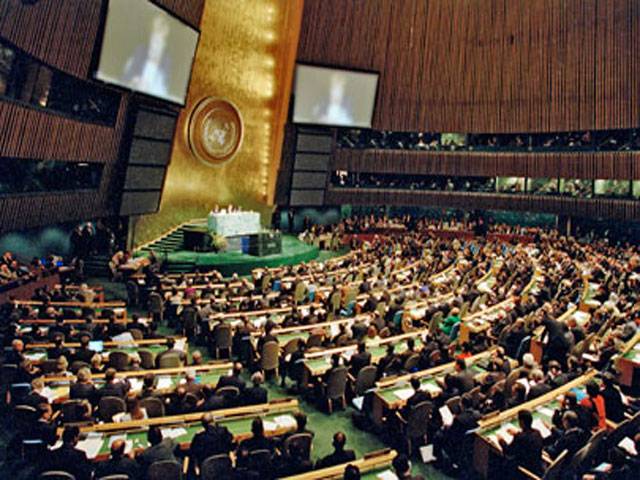UNITED NATIONS - The 67th session of the UN General Assembly began on Tuesday, with Secretary-General Ban Ki-moon calling on world leaders to speak out and urge all people to respect the values and beliefs of others, following recent incidents of intolerance and hatred that are being exploited.
“We are living through a period of unease. We are also seeing incidents of intolerance and hatred that are then exploited by others. Voices of moderation and calm need to make themselves heard at this time. We all need to speak up in favour of mutual respect and understanding of the values and beliefs of others,” Ban told the 193-member assembly.
“The United Nations must rise to the moment,” he said, as protests continued across the Muslim world over an anti-Islam video produced in the United States.
He said the deteriorating situation in Syria will be “foremost in our minds" as leaders gather here next week.
The new General Assembly president, Vuk Jeremic, didn't mention Syria but said he has chosen the peaceful settlement of international disputes as the theme for the world body's work over the next 12 months.
“Peace and security is a prerequisite for the stability needed for global economic growth, sustainable development and social progress,” he said.
Jeremic, a former Serbian foreign minister, outlined the main areas of focus for this year’s session, with the overarching theme being the peaceful settlement of international disputes. “I hope this framework will usefully serve the noble cause of preventing gathering conflicts and resolving existing ones.”
“Peace and security are essential to advance development,” Jeremic said, stressing that the General Assembly should focus not just on achieving the eight anti-poverty targets known as the Millennium Development Goals (MDGs), but also on the post-2015 agenda.
In particular, he underscored the importance of fulfilling the commitments made during the UN Sustainable Development Conference (Rio+20), which was held in Brazil in June.
“Our objective should be the full implementation of the mandate this body received at the Rio+20 Conference. This will require a decisive commitment to observe not only procedural deadlines but also the political and financial objectives it has been designed to accomplish.”
Jeremic also highlighted the importance of making progress on arms control and disarmament, strengthening UN peacekeeping, improving a global coordinated response to terrorism, and promoting human rights in the international arena during the next 12 months.
In addition, he emphasised that the rule of law would remain one of the main priorities on the assembly’s agenda. “Close to 800 years after the Magna Carta was promulgated, many people around the world still do not enjoy the fundamental rights enshrined in that seminal document - rights that protect individuals, while enabling countries to develop in peace and security, as sovereign equals,” he said. “I urge the member states to agree on a consensus document by the start of the high-level debate on the rule of law in a few days’ time.”
On his part, the UN chief congratulated Jeremic on his new role and thanked his predecessor Nassir Abdulaziz Al-Nasser for his leadership over the past year.
On Sept. 24, the General Assembly will convene a high-level meeting on the rule of law at the national and international levels, during which the UN member states, non-governmental organisations and civil society will work towards strengthening the rule of law.
The annual general debate, during which the General Assembly hears statements by heads of state and government including President Asif Ali Zardari as well as ministers, will begin on Sept 25 and conclude on Oct 1.
Also during its 67th session, which runs through mid-September 2013, the General Assembly will consider the outcome of the United Nations Conference on Sustainable Development (Rio+20).
The General Assembly is the main deliberative, policymaking and representative organ of the United Nations. Comprising all 193 members of the United Nations, the General Assembly meets in regular session intensively from September to December each year and thereafter as required.
Saturday, April 20, 2024
UN calls for respect of religious beliefs

Pak economy improving, funds will be provided on request: IMF
9:57 PM | April 19, 2024
Minister advocates for IT growth with public-private collaboration
9:57 PM | April 19, 2024
Judges' letter: IHC seeks suggestions from all judges
9:55 PM | April 19, 2024
Formula 1 returns to China for Round 5
9:05 PM | April 19, 2024
Germany head coach Julian Nagelsmann extends contract till 2026 World Cup
9:00 PM | April 19, 2024
A Tense Neighbourhood
April 19, 2024
Dubai Underwater
April 19, 2024
X Debate Continues
April 19, 2024
Hepatitis Challenge
April 18, 2024
IMF Predictions
April 18, 2024
Kite tragedy
April 19, 2024
Discipline dilemma
April 19, 2024
Urgent plea
April 19, 2024
Justice denied
April 18, 2024
AI dilemmas unveiled
April 18, 2024
ePaper - Nawaiwaqt
Advertisement
Nawaiwaqt Group | Copyright © 2024





